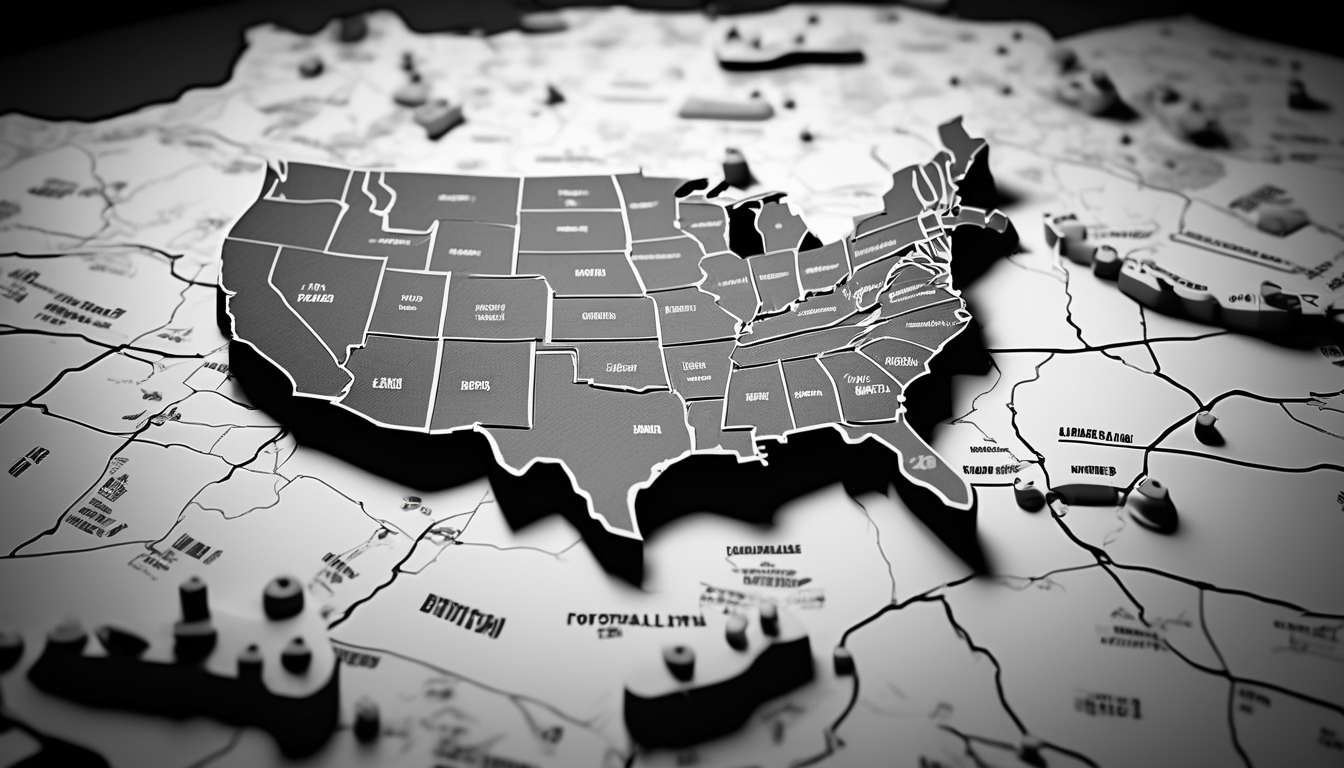As we delve into the ever-evolving landscape of sports betting in the United States, it’s intriguing to explore the states that still resist this growing trend. In recent years, many have witnessed a surge in the legalization of sports betting, transforming it into a mainstream pastime embraced across the nation. However, not all states have jumped on the bandwagon.
Together, we will navigate through the reasons and regulations that have kept sports betting off the table in certain states. By understanding the cultural, political, and economic factors at play, we can gain a clearer picture of why these states maintain their stance against this popular activity.
Our journey will uncover the nuances of this complex issue, inviting us to reflect on the diverse perspectives that shape the gambling landscape across America.
Join us as we explore the states where sports betting remains a topic of debate and deliberation.
Nevada
Nevada, often seen as the epicenter of sports betting in the United States, offers a comprehensive and well-established regulatory framework. The roots of sports betting in Nevada date back to 1949 when the state first legalized it, breaking free from the nationwide prohibition that kept many other states in check. This decision positioned Nevada as a trailblazer in creating legislation that balances both business interests and consumer protection.
Our exploration of Nevada’s sports betting landscape reveals a community that has embraced these activities as an integral part of its identity. Unlike states that still wrestle with prohibition, Nevada’s legislation fosters a sense of belonging among sports enthusiasts and bettors.
Key aspects of Nevada’s sports betting model include:
- Robust oversight and regulation
- A balance between business interests and consumer protection
- A cultural embrace of sports betting as part of state identity
Nevada’s model is often looked upon as a benchmark for other states considering legislative change. By maintaining strong oversight and regulation, Nevada ensures that sports betting remains a vibrant and respected part of its culture, offering a blueprint for others.
Utah
Utah stands out as one of the few states where sports betting remains entirely prohibited, reflecting its commitment to preserving traditional values. Unlike many states that have embraced the changing landscape of sports betting legislation, Utah’s prohibition remains steadfast. This decision is deeply rooted in the state’s cultural and religious fabric, emphasizing community and family values over gambling.
Utah’s legislation reflects a collective choice to prioritize these principles. We, as residents or admirers of Utah, understand that this stance fosters a unique sense of community and belonging. It is a reminder of how laws can align with the values we hold dear, shaping our environment and daily lives.
While other states explore the economic benefits of legalizing sports betting, Utah’s consistent prohibition highlights a preference for maintaining a tradition-focused lifestyle. This choice invites us to reflect on the importance of aligning laws with our core beliefs, fostering a community where we can connect over shared values and cherished traditions.
Hawaii
Hawaii, like Utah, doesn’t allow sports betting, reflecting its dedication to preserving its cultural and social values.
We understand that a sense of community and shared traditions are at the heart of our island life. The legislation prohibiting sports betting aligns with this focus, ensuring that our cultural integrity remains intact. It’s not just about restricting a form of entertainment; it’s about protecting what makes us unique.
The current prohibition on sports betting in Hawaii is deeply rooted in our desire to maintain the social fabric that binds us together. Our lawmakers have consistently shown a commitment to these values by keeping legislation targeted at legalizing sports betting at bay.
We recognize that for some, this might seem like:
- A missed opportunity for economic growth
- A source of entertainment
However, we believe that our community’s well-being and unity are worth preserving above all else. Together, we embrace this stance as a reflection of our shared identity and collective priorities.
Alaska
Alaska remains cautious about introducing sports betting, reflecting its commitment to preserving the natural and cultural heritage unique to the state.
We understand that as Alaskans, our connection to the land and community defines us. This cautious stance allows us to weigh the potential impact of sports betting on our shared values and traditions.
Current Legislation
Currently, sports betting faces prohibition in Alaska, as the state’s legislation prioritizes maintaining a balance between economic opportunities and cultural preservation.
Although the potential revenue from legalized sports betting is enticing, our legislators are considering the broader implications such a shift might bring to our communities. They’re focused on ensuring any changes align with our collective identity.
Community Involvement
We’re all part of this dialogue, and our voices matter as the conversation around sports betting legislation evolves.
As we navigate this landscape together, it’s crucial to consider how such changes might impact our way of life, ensuring our future remains as connected and vibrant as our past.
Idaho
In Idaho, we’re witnessing a cautious approach to sports betting as state authorities prioritize preserving traditional values over potential economic gains. This mindset resonates deeply within our community, where we take pride in our roots and shared values.
The current legislation reflects a strong stance against the legalization of sports betting, aligning with the prohibition of gambling activities that might disrupt our societal norms. Our state’s lawmakers have maintained this prohibition, emphasizing the importance of protecting our community from possible negative consequences.
While some states embrace the economic benefits tied to sports betting, Idaho remains steadfast in its commitment to safeguarding our collective culture and values. We understand this decision isn’t merely about restricting activities but about fostering a sense of belonging and unity.
As discussions around this topic continue, it’s crucial for us to:
- Engage in conversations that respect our values.
- Be open to understanding different perspectives regarding sports betting legislation.
By doing so, we can ensure that the dialogue around this issue remains respectful and inclusive.
Wisconsin
In Wisconsin, there has been a gradual shift towards accepting regulated sports betting, reflecting a balanced approach between embracing new revenue streams and addressing societal concerns. As a community, we understand the importance of staying connected with nationwide trends while maintaining our unique values. Our state’s journey with sports betting has been one of careful consideration and thoughtful legislation.
Current Legislation:
- Wisconsin allows sports betting under specific conditions.
- Tribal casinos have been at the forefront, offering limited sports betting options through negotiated agreements.
- This represents progress given the long-standing prohibition that was once in place.
Community Perspectives:
- Some residents are eager to see sports betting expand beyond tribal lands.
- Others appreciate the cautious path taken, valuing a balanced approach.
By ensuring that all voices are heard, Wisconsin has managed to find a middle ground. Our community’s diverse perspectives help shape an approach that respects both tradition and progress, fostering a sense of belonging for all.
Texas
In Texas, we’re witnessing a dynamic debate over the potential legalization of sports betting, with passionate arguments on both sides. As fellow Texans, we understand the cultural significance of sports in our state, which makes this discussion resonate deeply.
Currently, the prohibition of sports betting remains, leaving us to rely on legislation for any future changes. Many of us are eager to see Texas join the growing list of states embracing sports betting, hoping for:
- Increased revenue
- Community benefits
On the other side, some Texans worry about the implications of legalization, including:
- Potential gambling addiction
- Its impact on our communities
The stakes are high, and the conversations in Austin reflect our diverse perspectives. Advocates for legalization argue that regulated sports betting could:
- Enhance state revenues
- Provide a safer environment for bettors
Meanwhile, opponents stress the need for caution, emphasizing potential social costs. As Texans, our voices are vital in shaping the future of sports betting legislation here.
Vermont
In Vermont, we’re witnessing a cautious approach to the idea of legalizing sports betting. Discussions are primarily focused on:
- Potential economic benefits
- Regulatory challenges
Our small yet vibrant community values careful consideration. It’s clear that any move towards legislation will require a thorough examination of how sports betting could impact us all.
We’re exploring how to balance:
- The enthusiasm for sports wagering
- The need for robust regulatory frameworks that ensure fairness and integrity
The current prohibition on sports betting reflects Vermont’s commitment to protecting its residents while evaluating the implications of such changes. As stakeholders, we feel a strong sense of responsibility to engage in conversations about what sports betting legislation could mean for our state.
The potential revenue from sports betting could fund essential public services. However, we’re also aware of the social concerns it might bring.
Together, we’re exploring how to craft a solution that:
- Respects our values
- Fosters a sense of belonging for everyone involved
Conclusion
If you’re looking to place a bet on sports, avoid the following states as they currently don’t allow sports betting:
- Nevada
- Utah
- Hawaii
- Alaska
- Idaho
- Wisconsin
- Texas
- Vermont
You’ll need to find other avenues for your gambling fix if you’re in these states.
Stay informed about the changing legal landscape, as laws around sports betting are constantly evolving.
Be prepared to adapt your betting strategies accordingly.

